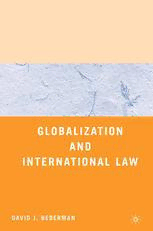
Globalization and International Law PDF
Preview Globalization and International Law
Globalization and International Law This page intentionally left blank Globalization and International Law David J. Bederman GLOBALIZATION AND INTERNATIONAL LAW Copyright © David J. Bederman, 2008. Softcover reprint of the hardcover 1st edition 2008 978-0-312-29491-5 All rights reserved. First published in 2008 by PALGRAVE MACMILLAN™ 175 Fifth Avenue, New York, N.Y. 10010 and Houndmills, Basingstoke, Hampshire, England RG21 6XS Companies and representatives throughout the world. PALGRAVE MACMILLAN is the global academic imprint of the Palgrave Macmillan division of St. Martin’s Press, LLC and of Palgrave Macmillan Ltd. Macmillan® is a registered trademark in the United States, United Kingdom and other countries. Palgrave is a r egistered trademark in the European Union and other countries. ISBN 978-0-312-29478-6 ISBN 978-0-230-61289-1 (eBook) DOI 10.1057/9780230612891 Library of Congress Cataloging-in-Publication Data Bederman, David J. Globalization and international law / David J. Bederman. p. cm. Includes bibliographical references and index. 1. International law. 2. Globalization. I. Title. KZ3410.B425 2008 341—dc22 2007048028 A catalogue record for this book is available from the British Library. Design by Newgen Imaging Systems (P) Ltd., Chennai, India. First edition: June 2008 10 9 8 7 6 5 4 3 2 1 For Frank J. Cuzze, Jr., who lived a century of progress with the wisdom and faith of the ages This page intentionally left blank Contents Preface ix Abbreviations xv Part 1 A Short History of World Law 1 Empire 3 2 Belief 11 3 Conflict 19 4 Commerce 27 5 Dignity 35 6 Universalism 43 Part 2 Today’s Globalism 7 Movement 55 8 Commons 71 9 Disciplines 87 10 Crime 103 11 Culture 119 12 Technology 131 Part 3 Challenges for Globalism and World Law 13 Diversity 147 14 Permeability 159 viii Contents 15 Legitimacy 171 16 Exceptionalism 181 Part 4 Values for World Law Conclusion 191 Notes 203 Index 235 Preface T his book questions conventional wisdom about globalization and the development of a new world legal order. Although one might expect that the two topics linked together in the title of this volume—globalization and international law—would be the subject of countless studies and reflections that has actually not been the case.1 Indeed, one of the peculiarities of con- temporary globalization research is the extent to which it segregates what are perceived to be the “realities” or “empirics” of globalizing developments from any analysis of the jurisprudential, legal, and regulatory ordering of this new aspect of international life. This book will remedy this gap in scholar- ship by offering both an historical and pragmatic account of the relationship between globalization and international law. Conflicting definitions and paradigms of the phrase “globalization” have been perennially debated in academic literature and public discourse. Indeed, it has come to mean all things to all people, describing “a process, a condition, a system, a force, and an age.”2 Globalization is often referred to, in David Held’s and Anthony McGrew’s famous formulation, as a soci- ological process, “embod[ying] a transformation in the spatial organiza- tion of social relations and transactions—assessed in terms of their extensity, intensity, velocity, and impact—generating transcontinental or interregional flows and networks of activities, interactions, and the exer- cise of power.”3 But one vitally important theme of this book is that glo- balization is not just about the international dynamics of society and culture, or even of economics (which it is most often associated with), but also has definitive historical, political, and, yes, legal, aspects that need to be fully explored if a complete picture of contemporary international rela- tions is to be appreciated. The concept of international law—the norms, rules, and institutions that govern the relations among States and the conduct of actors, transactions, and relationships across national borders—is more conventional (and less con- tested), even though probably less acknowledged in current debates about international affairs. Although my approach to globalization is from the per- spective of both an international historian and academic international lawyer, this book is by no means a conventional treatise on the law of nations. Quite the contrary, this volume attempts to chart the routes to, and boundaries of, a terra incognitae: a newly emerging body of global rules of political, social, and economic interaction that can be rightly called “world law.”
